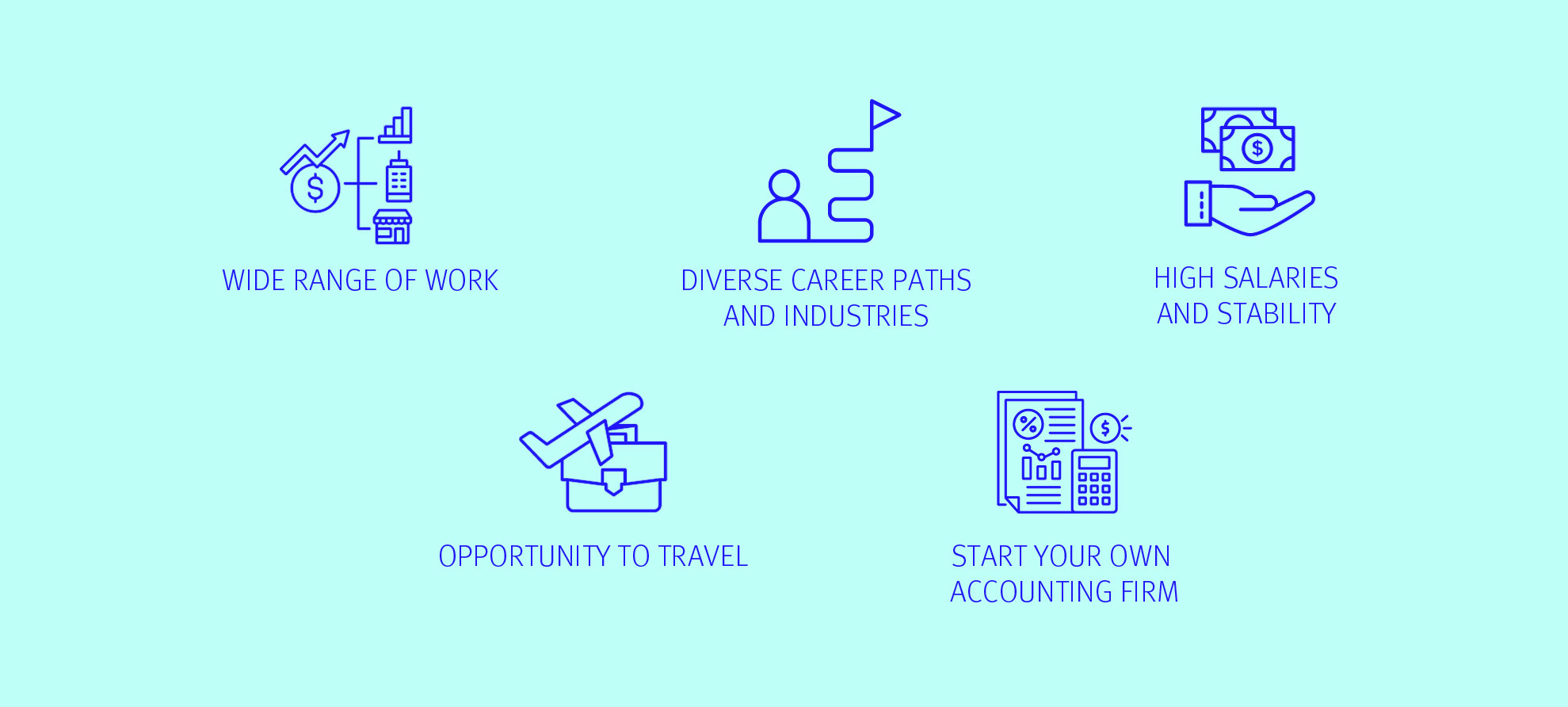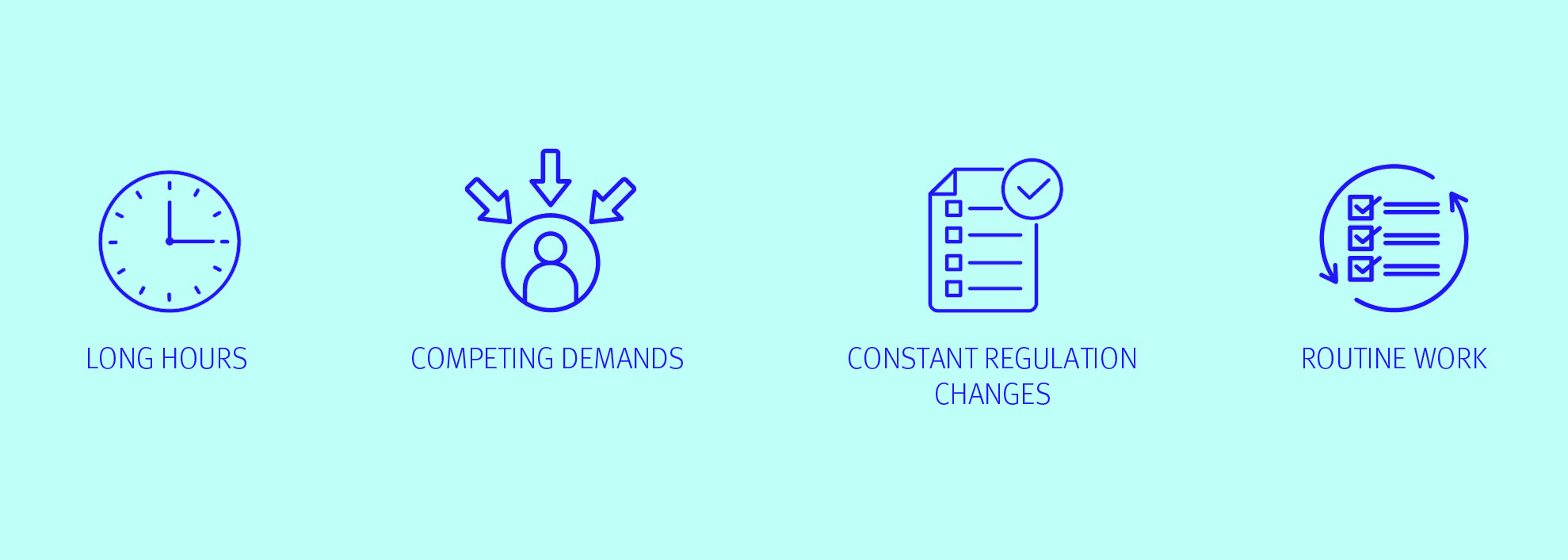Working in accounting – top things you need to know
Are you thinking about a career in accounting?
Working as an accountant can be fulfilling as you are helping individuals and businesses get a clearer picture of their current finances and guiding them to better investments and a healthier financial future. However, there can also be challenges such as long hours and competing deadlines.
In this blog, we will explain the qualities that make a good accountant and the benefits and challenges of working in accounting to help you decide whether this career suits your personality and working styles. Two of our alumni, who have progressed in the accounting industry, will also share their experience and advice.
QUALITIES OF A GOOD ACCOUNTANT
To be a good accountant, it’s not just about being good with numbers, there are several other qualities you need to possess.
GOOD COMMUNICATION SKILLS
Communication skills is the top soft skill for accountants. You need to be able to explain financial information (e.g. tax returns, data insights) to your clients who do not have a financial background and translate difficult or complicated concepts in ways they can understand.
TECH-SAVY
Automation and AI are transforming traditional accounting processes so you need to have the required tech skills to harness the advantages they bring. Financial transactions are mainly digital and businesses are using cloud-based accounting systems to store and analyse financial data. You need to be comfortable working with diverse software platforms and other tech tools for automation, data analysis and ways to enhance the customer experience.
ATTENTION TO DETAIL
Your financial reports need to be accurate and precise. Even the smallest error can have a major impact on a company’s finances. It’s important to have a methodical approach to calculations and fixing errors.
TEAM PLAYER
Accountants do not work in isolation but usually as part of a team. You need to be able to collaborate and strategise with others to fulfil business objectives.
ENJOYS PUZZLES/PROBLEM SOLVING
Accounting tasks are like puzzles to solve. You could find an anomaly during an audit, discover figures in financial records that don’t make sense or need a new way to process large transactions.
Each day may bring new challenges to solve. There may be new business developments, updated financial regulations or a client changes their mind. A good accountant is not afraid when problems arise but instead views them as opportunities to learn and strategise. You need to adapt quickly to new situations and find solutions.
ORGANISED/GOOD TIME MANAGEMENT SKILLS
Organisation skills are essential to effectively manage all your responsibilities. Accountants need to keep financial information and other sensitive data organised to reduce the risk of errors and be able to reference information efficiently.
You will have a portfolio of clients with different needs and requests. Your time management skills will help you prioritise and keep track of your progress for each one.
EMBRACES CHANGE
Accountants need to be able to adapt to evolving industry demands and client needs. You must be willing to learn about new business requirements and processes. For example, large corporations now have big datasets to be analysed. This may require you to learn a new software program and AI tools to deliver key financial insights.
TRUSTWORTHY
Your clients need to be able to trust you with their financial information and keep confidentiality. This also means investing in quality cyber security software or blockchain technology to protect your client’s records from cyber-attacks.
BENEFITS OF WORKING IN ACCOUNTING

WIDE RANGE OF WORK
When people think of accountants, they often think of someone analysing financial records and churning out reports all day. Today’s accountants have a variety of tasks and projects such as business valuation, financial modelling, risk management, budgeting and taxation. They also have the advantage of AI and other technology to analyse large datasets and automate administrative tasks to free them for more strategic and challenging tasks.
DIVERSE CAREER PATHS AND INDUSTRIES
Every organisation needs an accountant. This means you have the flexibility of choosing which location and workplace you want to gain experience. You can work in your home country or work overseas. You can work in government, non-profit organisations, corporations or academia. There are a variety of accounting roles such as:
Accounts payable / receivable
Investments Analyst
Financial Analyst
Tax Manager
Accounting Manager
Accounting risk analyst
Financial Advisor and
Finance Director
You may decide to specialise in a particular area of accounting such as tax, audit, investment, forensics or environmental accounting. Accounting can also serve as a foundation for other career paths in areas such as business, consulting and education.
HIGH SALARIES AND STABILITY
Working in accounting can provide you a healthy and stable salary. The average annual salary for accountants in Australia is $95,000 per year. Entry-level positions start at A$80,000 with more experienced workers making up to A$118,720 each year. Chief Financial Officers can command an average salary of $210,000 per year.
Since every organisation needs an accountant to oversee its finances, the number of accounting jobs continues to rise. In Australia, the accounting industry has a projected 9.2% growth up to the year 2026.
OPPORTUNITY TO TRAVEL
If you work for a multinational company with offices in other parts of the world, you may have the opportunity to travel or be offered a secondment. You may also need to travel to meet with overseas clients.
START YOUR OWN ACCOUNTING FIRM
While working as an accountant, you will become familiar with the operations of running a business and strategies to ensure profitability. Your business acumen and the soft skills you have developed can help you start and run your own accounting firm.
CHALLENGES OF WORKING IN ACCOUNTING

LONG HOURS
Depending on the company you work for and the number of clients in your portfolio, accountants can work long hours. Times such as end of the month or end of the financial year are particularly busy and may require you to work overtime to ensure you meet deadlines. To manage these busy periods, set deadlines for your clients to submit what is needed and equip them with helpful tools such as checklists to ensure you have all the records you need to complete their reports.
COMPETING DEMANDS
With multiple clients in your portfolio who have different needs and requests, you may feel stressed balancing a lot of tasks while trying not to make any mistakes. This is when your organisation and time management skills will be essential to ensure you delivery all your reports on time. Using a measure of automation in software will help eliminate time-consuming, manual tasks.
CONSTANT REGULATION CHANGES
The laws and regulations that impact your work as an accountant will always be revised. You need to keep up to date with any regulation changes by leveraging technology, reading industry publications or attending industry-leading seminars or webinars.
ROUTINE WORK
As much as the accounting industry is evolving, there are still routine tasks or projects you need to do such as month end reports. Do not expect that every day will bring new and exciting things to do.
Pro tip:
Your education shouldn’t end at university or when you get your first accounting role. Education is lifelong – there is always something new to learn. Upskill with online courses to keep up with industry trends and evolving techniques. Connect with industry professionals on LinkedIn.
Many accounting graduates do further study with accounting bodies such as Certified Public Accountant (CPA) Australia and Chartered Accountants whose programs can help you advance your career into senior finance roles.
ADVICE FROM TWO SENIOR ACCOUNTING MANAGERS
ANASTASSIYA LYSSENKO
Insolvency and Business Advisor, AVA Advisory
Graduated with a Bachelor of Business (majoring in Accounting), 2016

Please share about your journey from graduation to where you are now in your career.
In 2016, at the age of 19, I graduated with a Bachelor of Business with a major in accounting from Kaplan Business School. By that time, I had already begun my career by co-founding a startup with my business partner and working in the corporate world.
Over the years, I have worked across multiple companies in various industries, ranging from resource management to a large construction business. My focus has always been on the business and financial aspects, as these are my true passions and strengths. I have consistently pursued further formal education. Recently, I completed a certification in the insolvency industry.
What are your responsibilities as an Insolvency and Business Advisor at AVA Advisory?
My role at AVA Advisory falls into two areas which are insolvency-focused advice and general business consulting. I started as a strategist writing reports on the company’s financial and restructuring proposals. I spent most of the time communicating with clients and other stakeholders, negotiating the turnaround terms and overall restructuring deal.
It’s been a highly rewarding career path, and I greatly enjoy working with a range of clients in diverse industries, from industrial tree cutting businesses to NDIS companies. While the work can sometimes be complex and challenging, it is incredibly fulfilling to assist companies in navigating difficult situations and helping them secure a second chance at success.
What are the myths and realities of working in accounting?
The myth is that you’re going to be ready for the workforce once you graduate. The reality is that there is so much to learn on the job. You can’t just rely on the theory but you need to put it into practice. Success is achieved through hard work; there is no shortcut or an easy way to advance your career.
What technical skills and soft skills do you need to develop?
It is important to stay on top of industry regulations, rules, updates and ongoing developments. Read blogs and add yourself to the mailing list of industry groups to receive regular updates and advice.
Clear and concise communication is an important skill as you deal with more stakeholders. You need to be able to translate your findings and provide recommendations in a way they can understand.
How do you continue to learn and grow professionally?
Attend industry events, webinars and study short courses. Stay in touch with your alumni community. You can provide and receive guidance from your peers.
THYAGO WRIGG
Senior Manager, ITVP ANZ Hub Controller, Warner Bros ITVP
CPA
Graduated with a Master of Accounting, 2016

Please share about your journey from graduation to where you are now in your career.
After graduating with a Master of Accounting from Kaplan Business School, I secured a role as an Accounts Payable Officer at an advertising company while studying for the CPA program. After I completed the CPA program, I started working as a Financial Accountant at Warner Bros and was later promoted to the role of Senior Finance Manager.
How do you decide which area of accounting to pursue?
The best way to decide what might suit you best is researching each area of interest and talking to professionals (e.g. at networking events) to get their insights. Also, conduct a self-reflection of your career goals. There is no right or wrong answer, only you can decide what is a good fit for you.
What are the myths and realities of working in accounting?
The myth is that there is no life balance in accounting. The reality is that there is a lot of work each day, but it can be managed by prioritising your tasks. The other myth is that accountants are good at complex mathematics. The reality is that most aren’t; it is the accounting systems that make the calculations for us.
What challenges do accountants face?
Legislation is constantly changing and there are new or updated accounting standards and market expectations. Be sure to stay up to date by reading industry reports sent by your company’s banks and consultants. Attend CPA events and other networking events. As an accountant you need to stay informed and be flexible.
What is a highlight of working in accounting?
The parent company I work for is listed so I pride myself in knowing the financial statements are materially correct and investors can make decisions based on them. I also love working with Microsoft Excel.
Which technical and soft skills are most important?
The most important technical skill is understanding the accounting standards, business processes and the market. The most important soft skills are communication and stakeholder management. These are paramount for career progression.
Always stay professional and respectful. The finance market (in Sydney) is small and people tend to know each other or get to work together at some point. A great first impression opens doors and will take your career further.
Advance your career in accounting with our Master of Professional Accounting and Master of Accounting courses which are accredited by CPA and CA. Learn more about studying business in Australia.









